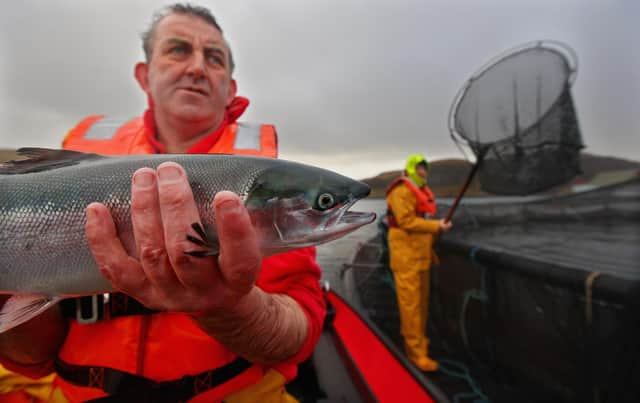Scottish salmon can turbo-boost our economy – it’s vital that we don’t miss this golden opportunity


The Chancellor may have delayed his Autumn statement until the middle of November, but it’s clear that it will contain significant public spending cuts.
When public services are facing a tough financial future, the revenues raised by businesses for the Treasury are more vital than ever.
Advertisement
Hide AdAdvertisement
Hide AdAnd that is particularly the case with a sector that remains a bright spot in the economy, such as farm-raised Scottish salmon.
Fish farmers in Scotland are naturally facing challenges – just like every business – including rising transport, energy and food costs, allied to inflation.
But demand for nutritious Scottish salmon remains incredibly high both at home and abroad.
The fish grown in Scotland’s remote, cold, clear waters are renowned across the globe, making salmon the UK’s largest food export.
Latest figures show that our sector generates £760million for the UK economy, with turnover in excess of £1billion, while supporting more than 12,500 jobs.
The collective effort of the salmon farming companies in Scotland produces a massive tax revenue for public services, not to mention the money raised through seabed rents.
During the two challenging years of Covid, Scottish salmon still managed to provide an additional £100million to the economy compared to pre-pandemic levels.
And this has been achieved despite our global market share falling because countries like Norway are growing faster, where production costs are significantly lower and regulation is more streamlined.
Advertisement
Hide AdAdvertisement
Hide AdThe Scottish government’s own figures reveal that Scottish salmon production in 2021 hit a record high, with the volume and value of the sector increasing.
With the right decision-making from governments, Scottish salmon could generate as much as £1billion through sustainable growth.
Just imagine the boost that could deliver for the public purse, as well as local jobs.
As the economic storm clouds gather, it is therefore imperative that governments tap into the full potential of the Scottish salmon sector.
For the Scottish Government, that means a more streamlined regulatory framework that is both transparent and efficient, removing the unnecessary planning delays and the bureaucracy generated by too many quangos.
And for the UK Government, it means addressing the post-Brexit challenges our sector faces.
Rishi Sunak is not the first leader in recent times to insist he can make Brexit work.
But if he truly wants to deliver on that promise, there are some key decisions to be made.
Advertisement
Hide AdAdvertisement
Hide AdIn August the salmon sector wrote to Mr Sunak, outlining how the UK Government can help deliver greater growth.
Labour shortages across our businesses are acute.
Despite an average salary across the sector of £36,000 and numerous and continual employment initiatives, we do not have enough workers across key skill sets.
Our labour pool has shrunk considerably in recent years, with key staff returning home to eastern Europe.
Low unemployment and extremely limited labour availability in areas where our businesses have processing facilities mean factories have been running around 20 per cent light on staff.
Increased automation and other technology is helping, but the fundamental need is for more skilled workers.
Our farmers are out on the water every day caring for their fish. It is, and always will be, a hands-on, human business.
A more enlightened approach to immigration is therefore vital to assist business, and I urge the new Home Secretary Suella Braverman to recognise this.
Steps could include a change to key worker definitions, changes to the salary cap level, and a broader public signal that the UK is open to people and business.
Advertisement
Hide AdAdvertisement
Hide AdIf there is no change in the Home Office’s approach, we simply won’t be able to grow at the rate needed to compete with our international neighbours, and we will miss out on the opportunity to improve the UK’s economic situation.
At the same time, maintaining and enhancing our export position to the EU and wider European markets is of considerable importance to farming businesses.
Despite the increased costs of export and some delays at the Channel as salmon passes into France every night of the year, our businesses have worked closely with the UK Government to minimise the disruption.
Any escalation of EU-UK negotiations over the Northern Ireland protocol is high on our risk register.
It is encouraging that Downing Street this week said that Sunak set out in a call with Taoiseach Micheál Martin that his “preference remained a negotiated outcome” on the protocol.
Our ask is that a pragmatic approach is taken to these negotiations by the Sunak Government.
No UK export business needs a trade war or even the suggestion of one.
There must be a clear focus on the nation’s export businesses which depend on a positive, professional relationship with France and the other countries of the EU.
Advertisement
Hide AdAdvertisement
Hide AdTo demonstrate why this matters so much to the UK economy, Scottish salmon exports recovered to near-record figures in 2021, increasing to £614million.
Exports were shipped to 52 different markets, with growth across 10 of the top 20 markets, and the EU accounted for 61 per cent of the volume of global Scottish salmon exports.
As demand for Scottish salmon continues to rise, I urge the UK Government to navigate a way through this that doesn’t harm vital trade deals.
Delivering the pro-business changes outlined here would go a long way to securing export growth, which in turn would be a strong lever to help the country level up.
Scottish salmon can turbo-boost our economy – and in these difficult times it’s vital that we don’t miss this golden opportunity.
Tavish Scott is chief executive of Salmon Scotland, the trade body for Scotland’s farm-raised salmon sector